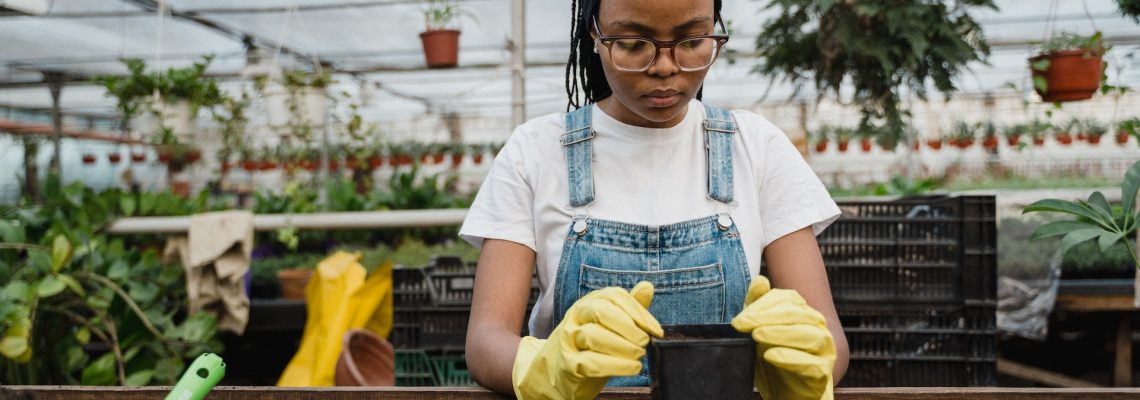Welcome to the world of herb gardening! If you have a passion for growing fresh and flavorful herbs, starting a herb garden business can be a profitable and rewarding venture.
With the increasing demand for organic and locally grown produce, herbs have become a popular choice for home cooks and professional chefs alike. By starting your own herb garden business, you can provide your customers with high-quality, fresh herbs that are packed with flavor and nutrients.
How to succeed in the herb gardening business
To succeed in the herb gardening business, you will need to have a strong sales and marketing strategy in place. This means understanding your target audience, identifying their needs, and creating a compelling message that resonates with them.
Whether you plan to sell your herbs at local farmers’ markets, online, or directly to restaurants and other businesses, your marketing efforts will play a crucial role in attracting and retaining customers. By using social media, email marketing, and other digital tools, you can reach a wider audience and build a loyal customer base.
So why wait?
Start your herb garden business today and take the first step towards a thriving and successful career in the world of herb gardening.
Main reasons to start a herb garden business
Growing demand for organic and locally sourced produce
With increasing awareness and concerns about food safety, environmental impact, and health benefits, more and more consumers are seeking out organic and locally sourced produce. As a herb garden business owner, you can tap into this growing demand by providing fresh, high-quality, and pesticide-free herbs to your customers.
Herbs are easy to grow and require minimal space and investment
Herbs are some of the easiest plants to grow, even for beginners. They require minimal space, and with the right tools and techniques, can be grown indoors, outdoors, or in small containers. Additionally, compared to other crops, herb gardening can be relatively low-cost, making it an accessible and affordable option for aspiring entrepreneurs.
Herbs have a high profit margin compared to other crops
Because herbs are small and lightweight, they can be grown in large quantities in a small space, resulting in a high yield and profit margin. Additionally, herbs are in high demand and can be sold at a premium price compared to other crops.
Herbs are versatile and can be used in a variety of dishes and products
From cooking and baking to teas and aromatherapy, herbs have a wide range of uses and applications. As a herb garden business owner, you can leverage this versatility by offering a variety of herbs and products to your customers.
Herb gardening can be a fulfilling and rewarding hobby or career
Herb gardening can be a relaxing and enjoyable hobby, as well as a rewarding and fulfilling career. Whether you are passionate about plants, health and wellness, or entrepreneurship, herb gardening can provide a sense of purpose and satisfaction.
Herbs have health benefits and are increasingly popular among health-conscious consumers
Herbs have been used for centuries for their medicinal and therapeutic properties. Today, with a growing interest in natural remedies and wellness, herbs are more popular than ever. By providing fresh and organic herbs to health-conscious consumers, you can contribute to their overall wellbeing and enjoyment of life.
The herb gardening business is a growing market, with many opportunities for expansion and diversification
As the demand for organic and locally sourced produce continues to grow, the herb gardening business is poised for continued expansion and diversification. Whether you want to specialize in rare and exotic herbs, create your own line of herbal products, or partner with local restaurants and businesses, there are many opportunities to grow and thrive in this dynamic industry.
Herbs can be grown year-round, providing a consistent source of income
Unlike seasonal crops, herbs can be grown year-round, providing a steady and consistent source of income. This can help ensure the sustainability and stability of your business, as well as provide a reliable income stream for yourself and your employees.
Herb gardening can be environmentally friendly, using natural and sustainable growing practices
Herb gardening can be a sustainable and environmentally friendly practice, using natural and organic growing methods that promote soil health and biodiversity. By adopting eco-friendly practices, you can reduce your carbon footprint and contribute to a healthier and more sustainable planet.
Starting a herb garden business can provide a sense of independence and control over one’s career and financial future
Finally, starting a herb garden business can be a great way to take control of your career and financial future. By being your own boss, setting your own hours, and pursuing your passions, you can create a fulfilling and rewarding lifestyle that aligns with your values and goals.
How to start a herb garden business
If you’re considering starting a herb garden in Australia, you may be wondering how to get started? Here are some of the main reasons to consider to get your garden off the ground, literally…
Research and Planning
Research and planning are critical steps in starting an herb garden business. Here’s a more detailed explanation of what each step entails:
Identify your target market and competition
Before starting an herb garden business, it’s essential to understand who your target market is and what competition exists in your area. This involves researching demographics, consumer behavior, and purchasing patterns to identify the most viable market for your herbs. You can also look at the competition to identify gaps in the market or areas where you can differentiate yourself from others.
Determine the demand for herbs in your area and which herbs are most in demand
Understanding the demand for herbs in your area is crucial to determining which herbs to grow and how much to plant. This involves researching which herbs are most popular and in-demand in your area and identifying any niche markets that are underserved. By doing so, you can focus on growing herbs that are most likely to sell and ensure that you have a consistent supply of fresh, high-quality herbs for your customers.
Create a business plan that includes your goals, strategies, and financial projections
Creating a business plan is essential for any new business. Your business plan should outline your goals, including your mission statement, long-term objectives, and strategies for achieving those goals. It should also include a financial plan that outlines your startup costs, projected revenue, and expenses, as well as any funding you may need to secure. This will give you a roadmap for your business and help you stay on track as you grow and expand your herb garden business.
Overall, research and planning are crucial to the success of your herb garden business. By taking the time to understand your target market, competition, and demand for herbs in your area, and creating a solid business plan, you can set yourself up for success and create a thriving herb garden business.
Location and Growing Space
Choosing the right location and growing space is crucial to the success of your herb garden business. Here’s a more detailed explanation of what each step entails:
Choose a location that has access to sunlight, water, and good soil quality
The location you choose for your herb garden should have access to sunlight, water, and good soil quality. Most herbs require at least 6 hours of sunlight per day, so it’s important to choose a location that gets adequate sun exposure. Water is also critical for growing herbs, so you’ll want to ensure that your growing space is close to a reliable source of water. Good soil quality is also essential, as herbs thrive in nutrient-rich soil that drains well. You may need to conduct a soil test to determine the pH level and nutrient content of your soil and make any necessary amendments.
Determine how much space you will need to grow your herbs, whether it is indoors or outdoors
The amount of space you need will depend on how many herbs you plan to grow and whether you plan to grow them indoors or outdoors. If you’re growing herbs indoors, you may need to invest in shelving or other vertical growing systems to maximize space. If you’re growing herbs outdoors, you’ll need to consider factors like the size of your garden beds and the distance between plants.
Prepare your growing space by removing any debris or weeds, and amend the soil if necessary
Before planting your herbs, you’ll need to prepare your growing space by removing any debris or weeds and amending the soil if necessary. This may involve tilling the soil to loosen it, adding compost or other organic matter to improve soil structure and fertility, and adding any necessary amendments to adjust pH or nutrient levels. You’ll also need to ensure that your growing space is free of pests and diseases that could harm your herbs.
Overall, choosing the right location and growing space is essential to growing healthy, vibrant herbs. By ensuring that your growing space has adequate sunlight, water, and soil quality, and preparing the space properly before planting, you can set your herbs up for success and ensure a bountiful harvest.
Herb Selection and Planting
Selecting the right herbs and planting them correctly is crucial to the success of your herb garden business. Here’s a more detailed explanation of what each step entails:
Research and choose the herbs you want to grow based on demand, marketability, and growing conditions
When selecting which herbs to grow, you’ll want to consider factors like demand, marketability, and growing conditions. Research which herbs are most in demand in your area and which ones are the most marketable. You’ll also want to consider factors like the growing requirements of each herb, such as the amount of sunlight, water, and nutrients each one needs to thrive. This will help you choose the right herbs for your garden and ensure that you can grow high-quality herbs that are in demand.
Purchase high-quality herb seeds or seedlings from reputable sources
To ensure the success of your herb garden, you’ll want to purchase high-quality herb seeds or seedlings from reputable sources. This will ensure that your herbs are healthy and free from diseases or pests that could harm your plants. You may also want to consider purchasing organic or non-GMO seeds to ensure the quality and sustainability of your herbs.
Plant your herbs according to the specific growing requirements of each herb, such as spacing, depth, and watering needs
Once you have selected your herbs and purchased your seeds or seedlings, it’s time to plant them. You’ll want to follow the specific growing requirements of each herb, including spacing, depth, and watering needs. Proper spacing is important to ensure that your herbs have enough room to grow and don’t compete for resources. You’ll also need to plant your herbs at the appropriate depth and ensure that they receive the right amount of water and nutrients.
Use natural and organic growing methods to ensure the quality and flavor of your herbs
To ensure that your herbs are of the highest quality and have the best flavor, you’ll want to use natural and organic growing methods. This may involve using compost or other organic fertilizers to provide your herbs with the nutrients they need to thrive. You may also want to use natural pest and disease control methods, such as companion planting or using organic pesticides, to protect your plants without harming the environment.
Overall, selecting the right herbs and planting them correctly is essential to the success of your herb garden business. By choosing high-quality seeds or seedlings, planting your herbs correctly, and using natural and organic growing methods, you can grow healthy, flavorful herbs that are in demand and ensure the success of your business.
Harvesting and Processing
After you’ve successfully grown your herbs, the next step is to harvest and process them to maintain their quality and prepare them for sale. Here’s a more detailed explanation of what each step entails:
Harvest your herbs at the optimal time to ensure maximum flavor and nutrient content
Harvesting your herbs at the right time is crucial to ensuring that they have maximum flavor and nutrient content. The timing of the harvest will vary depending on the herb and the part of the plant you’re harvesting. For example, you’ll want to harvest basil leaves before the plant flowers, while rosemary can be harvested throughout the growing season. Be sure to research the specific timing for each herb to ensure that you’re harvesting it at the optimal time.
Dry or process your herbs immediately after harvesting to maintain their freshness and quality
To maintain the freshness and quality of your herbs, you’ll want to dry or process them immediately after harvesting. There are several methods for drying herbs, including air-drying, using a dehydrator, or oven-drying. You may also want to consider processing your herbs in other ways, such as making them into teas, spice blends, or essential oils.
Package and label your herbs for sale, and consider creating value-added products such as teas, spice blends, or essential oils
Once your herbs are dry or processed, it’s time to package and label them for sale. You’ll want to choose packaging that is appropriate for the product, such as glass jars for dried herbs or tea bags for herbal tea. Be sure to include labels with the herb’s name, growing conditions, and any other relevant information.
Consider creating value-added products to increase the appeal of your herb garden business. For example, you could create teas, spice blends, or essential oils using your herbs. These products can provide additional revenue streams and appeal to a wider range of customers.
In summary, harvesting and processing your herbs is an important step in ensuring the quality and success of your herb garden business. By harvesting your herbs at the optimal time, drying or processing them immediately, and packaging them appropriately, you can provide customers with high-quality, flavorful herbs and value-added products.
Sales and Marketing
Sales and marketing are essential aspects of any successful business, and an herb garden business is no exception. Here are some tips for developing a successful sales and marketing strategy for your herb garden business:
Determine the most effective sales channels for your herb garden business
You’ll want to consider the various sales channels available to you, such as farmers’ markets, online stores, or direct sales to restaurants and businesses. Consider the benefits and drawbacks of each channel and determine which ones are most appropriate for your business.
Develop a marketing strategy that includes a strong brand identity, targeted advertising, and social media outreach
Developing a strong brand identity is essential for any business, and your herb garden business is no exception. You’ll want to create a name, logo, and visual identity that reflects the quality and unique nature of your products.
In addition to a strong brand identity, targeted advertising is crucial to attracting customers to your business. Consider advertising in local newspapers, magazines, and websites that appeal to your target market. You should also consider using social media platforms, such as Facebook and Instagram, to showcase your products and connect with potential customers.
Build relationships with your customers and community by offering exceptional customer service and educational resources
Building strong relationships with your customers is essential to the success of your herb garden business. You should offer exceptional customer service, including personalized recommendations and advice for using your herbs. You should also provide educational resources, such as workshops, classes, and blog posts, that teach customers about the benefits and uses of different herbs.
By following these tips for sales and marketing, you can create a successful and profitable herb garden business that attracts and retains loyal customers.
Business Operations and Management
Business operations and management are essential for running a successful herb garden business. Here are some tips to help you manage your business effectively:
Keep accurate records of your herb garden business finances
Keeping accurate records of your finances is crucial to the success of your business. You should keep track of all income, expenses, and inventory, as well as any loans or other financial obligations. This information will help you make informed decisions about pricing, inventory management, and other aspects of your business.
Hire and train employees as needed, and create a positive and supportive work environment
As your herb garden business grows, you may need to hire employees to help with planting, harvesting, processing, packaging, and sales. It’s important to create a positive and supportive work environment that fosters productivity and job satisfaction. This includes providing adequate training, fair compensation, and opportunities for growth and development.
Continuously evaluate and adapt your business strategies to meet the changing needs of your customers and industry
The herb garden business is constantly evolving, and it’s important to stay up-to-date with the latest trends and innovations. This means continuously evaluating and adapting your business strategies to meet the changing needs of your customers and industry. You should regularly review your sales and marketing strategies, product offerings, and pricing to ensure that you’re staying competitive and meeting the needs of your customers.
By following these tips for business operations and management, you can create a successful and profitable herb garden business that stands the test of time.
Starting an herb garden business can be a fulfilling and profitable venture with the right planning, resources, and dedication. By following these steps, you can create a successful and sustainable herb garden business that provides fresh, high-quality herbs to your customers while contributing to the health and wellbeing of your community.
Finances to consider when starting a herb garden business
Starting a herb garden business can be a great opportunity for anyone with a green thumb and a passion for gardening. However, like any business, it requires some financial investment. Here is a list of some of the finances you’ll need to consider when starting a herb garden business:
Start-up costs
You’ll need to purchase seeds or seedlings, equipment, and supplies to get your herb garden up and running. This may include soil, compost, pots or planting beds, irrigation systems, and gardening tools. The start-up costs will vary depending on the size and complexity of your operation.
Land or space rental
If you don’t have land to grow your herbs, you’ll need to rent or purchase a space. This can be an indoor space like a greenhouse or a room with grow lights, or an outdoor space like a garden plot. The cost of rent or purchase will depend on the location, size, and availability of the space.
Operating expenses
Once your herb garden is up and running, you’ll have ongoing expenses to keep it going. This may include the cost of water, electricity, and other utilities, as well as ongoing maintenance and repairs. You’ll also need to budget for supplies like fertilizer, pest control, and packaging materials.
Marketing expenses
To attract customers to your herb garden business, you’ll need to invest in marketing and advertising. This may include the cost of creating a website, printing business cards and brochures, and running ads on social media or local newspapers. You may also need to attend farmers’ markets or other events to promote your products.
Labor costs
As your herb garden business grows, you may need to hire employees to help with planting, harvesting, and processing. You’ll need to budget for the cost of wages, payroll taxes, and any benefits you offer.
Legal and administrative expenses
Starting a business comes with legal and administrative expenses. You’ll need to register your business, obtain any necessary permits or licenses, and file taxes. You may also want to consult with an attorney or accountant to ensure that you’re following all legal requirements and managing your finances effectively.
In conclusion, starting a herb garden business requires some financial investment, but it can be a rewarding and profitable venture. By carefully considering your start-up costs, operating expenses, and marketing strategies, you can create a successful business that brings fresh, flavorful herbs to your community.
FAQ's
Q. What are the most popular herbs to grow in a herb garden?
Some of the most popular herbs to grow in a herb garden include basil, parsley, cilantro, thyme, rosemary, oregano, and mint. However, the popularity of herbs may vary based on the location and the demand of the local market.
Q. Can I grow herbs indoors?
Yes, you can grow herbs indoors as long as you have access to sunlight or artificial light, good ventilation, and the right soil or growing medium. Indoor herb gardens can be ideal for those living in apartments or areas with limited outdoor space.
Q: How do I sell my herbs?
There are various ways to sell your herbs, such as setting up a booth at farmers’ markets, selling online through e-commerce platforms or your website, or supplying herbs to local restaurants or businesses. You may also consider creating value-added products like herb blends, teas, or essential oils to increase your product line and revenue.
Q: How do I price my cakes and desserts?
Pricing your cakes and desserts can be a challenge, but it’s important to factor in your ingredients, time, and overhead costs when setting your prices. Research the prices of other cake businesses in your area to get an idea of the market rates.
Q: How much money can I make from a herb garden business?
The profitability of a herb garden business depends on various factors, including the size of the operation, the demand for herbs in your area, and your marketing and sales strategies. However, with careful planning and execution, a herb garden business can generate a steady income stream for the business owner.
Q: How can I ensure the quality and safety of my herbs?
To ensure the quality and safety of your herbs, you can follow good agricultural practices, use natural and organic growing methods, and regularly test the soil and water for contaminants. You can also consider obtaining certifications such as organic or fair trade to demonstrate your commitment to quality and sustainability.
Herb garden business related articles

The Business of Herb Gardening: How to Market and Sell Your Products
Herb gardening is not only a fulfilling hobby but can also be a lucrative business venture. With the increasing demand for organic and natural products,

How to Package Fresh Herbs for Sale
Fresh herbs are a staple in many culinary dishes and are also used for their medicinal and aromatic properties. If you are starting a herb

Easiest Herbs to Grow for Your Herb Garden Business
If you’re thinking about starting an herb garden business, you’re in for a treat. Herbs are not only versatile and flavorful, but they are also

Legal Requirements for Herb Garden Business in Australia
Starting a herb garden business in Australia can be an exciting and profitable venture. However, like any business, there are legal requirements that need to

How to Promote Your Herb Garden Business
Promoting your startup herb garden business is essential to attract customers, increase sales, and build a strong brand presence. With the right marketing strategies and

